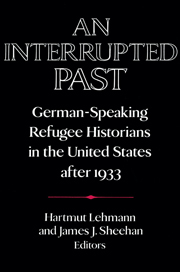Book contents
- Frontmatter
- Introduction
- PART I: Introduction
- 1 German and American Historiography in the Nineteenth and Twentieth Centuries
- 2 German Historiography during the Weimar Republic and the Émigré Historians
- 3 The Historical Seminar of the University of Berlin in the Twenties
- PART II: Introduction
- 4 Refugee Historians in America: Preemigration Germany to 1939
- 5 “Uphill Work”: The German Refugee Historians and American Institutions of Higher Learning
- 6 Everyday Life and Emigration: The Role of Women
- 7 The Special Case of Austrian Refugee Historians
- 8 Schicksalsgeschichte: Refugee Historians in the United States
- 9 German Historians in the Office of Strategic Services
- 10 The Refugee Scholar as Intellectual Educator: A Student's Recollections
- PART III: Introduction
- 11 German Émigré Historians in America: The Fifties, Sixties, and Seventies
- 12 The Americanization of Hajo Holborn
- 13 Explaining History: Hans Rosenberg
- 14 Ernst Kantorowicz and Theodor E. Mommsen
- 15 Refugee Historians and the German Historical Profession between 1950 and 1970
- Conclusion
- Index
2 - German Historiography during the Weimar Republic and the Émigré Historians
Published online by Cambridge University Press: 05 January 2013
- Frontmatter
- Introduction
- PART I: Introduction
- 1 German and American Historiography in the Nineteenth and Twentieth Centuries
- 2 German Historiography during the Weimar Republic and the Émigré Historians
- 3 The Historical Seminar of the University of Berlin in the Twenties
- PART II: Introduction
- 4 Refugee Historians in America: Preemigration Germany to 1939
- 5 “Uphill Work”: The German Refugee Historians and American Institutions of Higher Learning
- 6 Everyday Life and Emigration: The Role of Women
- 7 The Special Case of Austrian Refugee Historians
- 8 Schicksalsgeschichte: Refugee Historians in the United States
- 9 German Historians in the Office of Strategic Services
- 10 The Refugee Scholar as Intellectual Educator: A Student's Recollections
- PART III: Introduction
- 11 German Émigré Historians in America: The Fifties, Sixties, and Seventies
- 12 The Americanization of Hajo Holborn
- 13 Explaining History: Hans Rosenberg
- 14 Ernst Kantorowicz and Theodor E. Mommsen
- 15 Refugee Historians and the German Historical Profession between 1950 and 1970
- Conclusion
- Index
Summary
The history of German historiography during the Weimar period is closely correlated with the question of why the courageous attempt to establish a democratic order in Germany after the breakdown of the imperial regime in 1918 failed, a failure which resulted in the rise to power of National Socialism. In general, German historiography during this period must be seen as a major factor strengthening the trend in public opinion to look back to, and to judge, contemporary events against what seemed the happy days of Bismarck and Wilhelm II. There was a strong tendency to denounce the Weimar system as alien to the German historical tradition and imposed by the victorious Western powers against the wishes of the majority of Germans. Max Lenz, the holder of Ranke's chair at the University of Berlin, the most prestigious chair of history in Germany, declared it the task of the historical profession to mobilize the “moral energies” of former, greater generations of Germans against what he called “the pygmies of the day” in order to pave the way for a brighter future for the German nation-state. With good justification Bernd Faulenbach summarized the trends of German historiography in the interwar period under the heading Ideologie des deutschen Weges.
- Type
- Chapter
- Information
- An Interrupted PastGerman-Speaking Refugee Historians in the United States after 1933, pp. 32 - 66Publisher: Cambridge University PressPrint publication year: 1991
- 1
- Cited by

